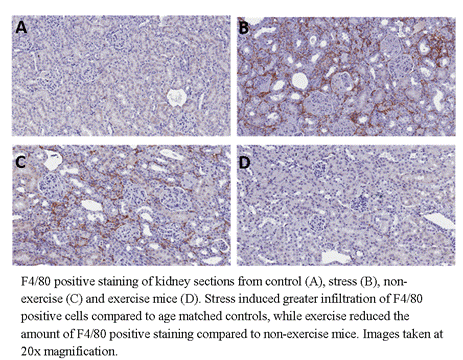Session Information
Session Type: ACR Poster Session B
Session Time: 9:00AM-11:00AM
Background/Purpose:
Chronic inflammation is pathognomonic of autoimmune diseases and contributes
to organ damage. Our group has previously shown that moderate daily exercise reduces
systemic inflammation in an acute inflammatory mouse model. It has also been
shown that social stress results in systemic inflammation. NZM2410 mice
develop severe nephritis with an auto-antibody profile similar to that of
Systemic Lupus Erythematosus (SLE). We investigated the effects of stress and exercise
on chronic inflammatory changes in lupus nephritis.
Methods:
All
experimental and control studies were carried out using NZM2410 after approval
by the IACUC. Mice in the exercise cohort were walked on a treadmill daily at a
pace of 8 m/min beginning at 18 weeks. Stress was induced in a separate cohort
daily over 6 consecutive days by placing an aggressor male in a cage with a
pre-existing social hierarchy. To track disease progression, serum was
collected weekly for blood urea nitrogen (BUN) level analysis and weights were
documented. Early removal criteria was defined as a BUN level exceeding 50
mg/dL and/or a 20% decrease in weight from baseline. Exercise mice were
compared to a non-exercise control group and stress mice were compared to
randomly selected, age matched controls upon meeting early removal criteria. Tissues
were collected in formalin, paraffin embedded and stained for analysis. Histopathological
scoring of coded specimens was performed by a board licensed veterinarian.
Results:
At
34 weeks, the entire non-exercise cohort met early removal, whereas 50% of the
exercise group survived until 39 weeks and pixel intensity of F4/80 + infiltration
was significantly lower in the exercise mice group. In contrast, compared to
age matched controls, the mice that underwent social stress showed a
significant increase in F4/80 + infiltrate which corresponded to significantly
more kidney damage as observed during histopathological analysis.
Conclusion:
Exercise and social stress have opposite effects on the NZM2410 chronic
inflammatory model of SLE and have significant effects on experimental
outcomes. Our data suggest that stress reduction and moderate daily exercise may
have positive effects on the clinical course of patients with chronic
inflammation associated with systemic autoimmune diseases and should be
explored as therapeutic intervention.
References:
1.
Powell,
ND, et al., Social stress up-regulates inflammatory gene expression in the
leukocyte transcriptome via beta-adrenergic induction of myelopoiesis. Proc
Natl Acad Sci U S A, 2013. 110(41): p. 16574-9.
2.
Rudofsky,
U.H. and Lawrence, D.A., New Zealand Mixed Mice: A Genetic Systemic Lupus
Erythematosus Model for Assessing Environmental Effects. Environ Health
Perspect,. 1999.107 Suppl 5:713-21.
To cite this abstract in AMA style:
Hampton J, Young NA, Agarwal S, Aqel S, Jones K, Wu LC, Powell N, Sheridan J, Bruss M, Jarjour WN. Disease Progression Is Altered By Moderate Exercise and Social Stress in a Murine Model of Lupus Nephritis [abstract]. Arthritis Rheumatol. 2015; 67 (suppl 10). https://acrabstracts.org/abstract/disease-progression-is-altered-by-moderate-exercise-and-social-stress-in-a-murine-model-of-lupus-nephritis/. Accessed .« Back to 2015 ACR/ARHP Annual Meeting
ACR Meeting Abstracts - https://acrabstracts.org/abstract/disease-progression-is-altered-by-moderate-exercise-and-social-stress-in-a-murine-model-of-lupus-nephritis/

